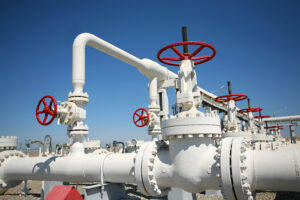As oil prices rose to highs not seen since 2008 yesterday — $139 a barrel — experts warned that the worst may yet be to come.
“Global oil markets are in the throes of the biggest crisis for decades,” wrote Ehsan Khoman of MUFG Bank. “We are not at maximum pain yet.”
Moscow’s invasion of Ukraine is redrawing global energy markets, bringing the previously unthinkable possibility of a total halt to Russian oil and gas exports into serious discussion and fuelling speculation over just how high prices can go.
Russia is the world’s third-largest oil producer and the largest exporter of oil, including oil products, to global markets, according to the International Energy Agency, with about 60 per cent of its exports going to Europe.
Global oil demand stood at about 100 million barrels a day late last year. Russia exports about 5 million barrels a day of crude and condensate and 2.8 million barrels of oil products.
Russia is also the world’s second-biggest natural gas producer, and in 2021 accounted for almost 40 per cent of the European Union’s gas supplies.
Russia’s crucial role in global supplies means sanctions on oil and gas exports had been all but ruled out by western nations — especially with markets already tight and prices high even before the invasion.
“We don’t have a strategic interest in reducing the global supply of energy,” Jen Psaki, the White House press secretary, said last week. “That would raise prices at the gas pump for the American people [and] around the world.”
Yet Russia’s outsized role in global energy markets also means oil and gas are also an outsized source of income fuelling President Putin’s regime, accounting for more than a third of government revenues last year.
As Russia’s bombardment of Ukraine has intensified, the possibility of energy sanctions has risen inexorably up the agenda, with Ukraine urging a full embargo on Russian oil and gas.
Already, increasing numbers of companies have stopped buying Russian oil, fearing falling foul of existing financial sanctions, future energy sanctions — or simply a reputational backlash.
When Shell on Friday bought a cargo of heavily discounted Russian crude it was met with opprobrium as Ukraine’s foreign minister tweeted: “Doesn’t Russian oil smell [like] Ukrainian blood for you?”
Khoman of MUFG said that about 70 per cent of Russian oil was now “struggling to find buyers” and that “in effect, Russian oil sales are under an embargo in all but name”.
This weekend the prospect of a formal embargo moved closer as Antony Blinken, the US secretary of state, said that Washington was in “very active discussions with our European partners about banning the import of Russian oil to our countries . . . while, of course, at the same time maintaining a steady global supply of oil”.
Whether those two things may be mutually exclusive is the key question, with yesterday’s spike in oil prices driven by fears that there simply is not enough spare capacity out there to replace Russia.
“If most of Russia’s oil exports are cut off, there could be a five million barrels per day or larger shortfall,” analysts at Bank of America warned last week. “That means oil prices could double from $100 per barrel to $200.”
The market is already scrambling “for additional barrels to fill what could balloon to a 3-4 million barrels per day Russian export deficit”, said Helima Croft, head of global commodity strategy at RBC Capital Markets, who warned that “this could prove to be a tall order”.
America is said to be considering sending a delegation to Saudi Arabia to “appeal for more production assistance”, which Croft argues Riyadh would consider “to avert a calamitous global economic crisis”.
However, she estimates that Saudi together with fellow Opec cartel producers the UAE, Kuwait and Iraq together “could only bring on between 2-2.5 million barrels per day in the next 30-60 days”.
Replacing Russian oil is therefore likely to need a nuclear deal with Iran that could mean sanctions being lifted and adding a further million barrels a day to the market, and a potential relaxation of US sanctions on Venezuela.
If all these things were to fall into place then higher exports from Saudi, Iran and Venezuela combined “could make a significant dent” in replacing Russian barrels, says Croft, but would take months to ramp up and leave no more spare capacity and “no room for error”.
The difficulty of replacing Russian supplies to Europe may mean that only America, which imports a modest 400,000 barrels a day from Russia, bans imports initially, analysts at Goldman Sachs said.
However, even the threat of US sanctions will “continue to severely curtail Russian seaborne oil exports, due to the threat of additional sanctions or of public censure”, they noted.
Without a breakthrough in peace negotiations, “demand destruction is now the only practical mechanism to rebalance today’s exceptionally tight oil market” argues Khoman of MUFG. He believes that for consumers to start rationing their oil usage could take “a Brent crude price of almost $180 a barrel”.
There has been less talk of formal sanctions on gas so far but gas prices have shot up, hitting new record highs in Europe yesterday. UK prices spiked to 20 times higher than a year ago.
Tom Marzec-Manser, gas expert at Icis, the price reporting agency, said that talk of an oil embargo raised the risk of “retaliatory” moves by Putin to cut gas exports and also increased the possibility of the West eventually sanctioning Russian gas.
Either scenario would represent a huge shock to gas markets. Analysts have warned that there is simply not enough liquefied natural gas spare in the world to replace Russian pipeline gas and that if supplies were cut off it would probably result in the rationing of gas for European industry and even the risk of blackouts.
Whether formal sanctions are imposed remains to be seen, with Germany insisting Russian energy supplies were “essential” for Europe.
Yet even the fear of such measures is pushing gas prices to such highs that it is starting to inflict economic damage on Europe, even while Russian gas keeps flowing.
“At these prices, we are likely approaching the limits of affordability in western Europe,” said Kaushal Ramesh of Rystad Energy, the consultancy.
Meanwhile, those surging prices are only further fuelling Russia’s income.
“What we are seeing in energy markets is a huge gift to Putin,” Simone Tagliapietra, a senior fellow at Bruegel, the European think tank, tweeted.
“US-EU need to decide now if to go full energy embargo (an oil embargo would lead to Russia’s gas cut anyhow) or just drop the idea overall. Discussing it without delivering just means huge additional revenues to Putin.”
















